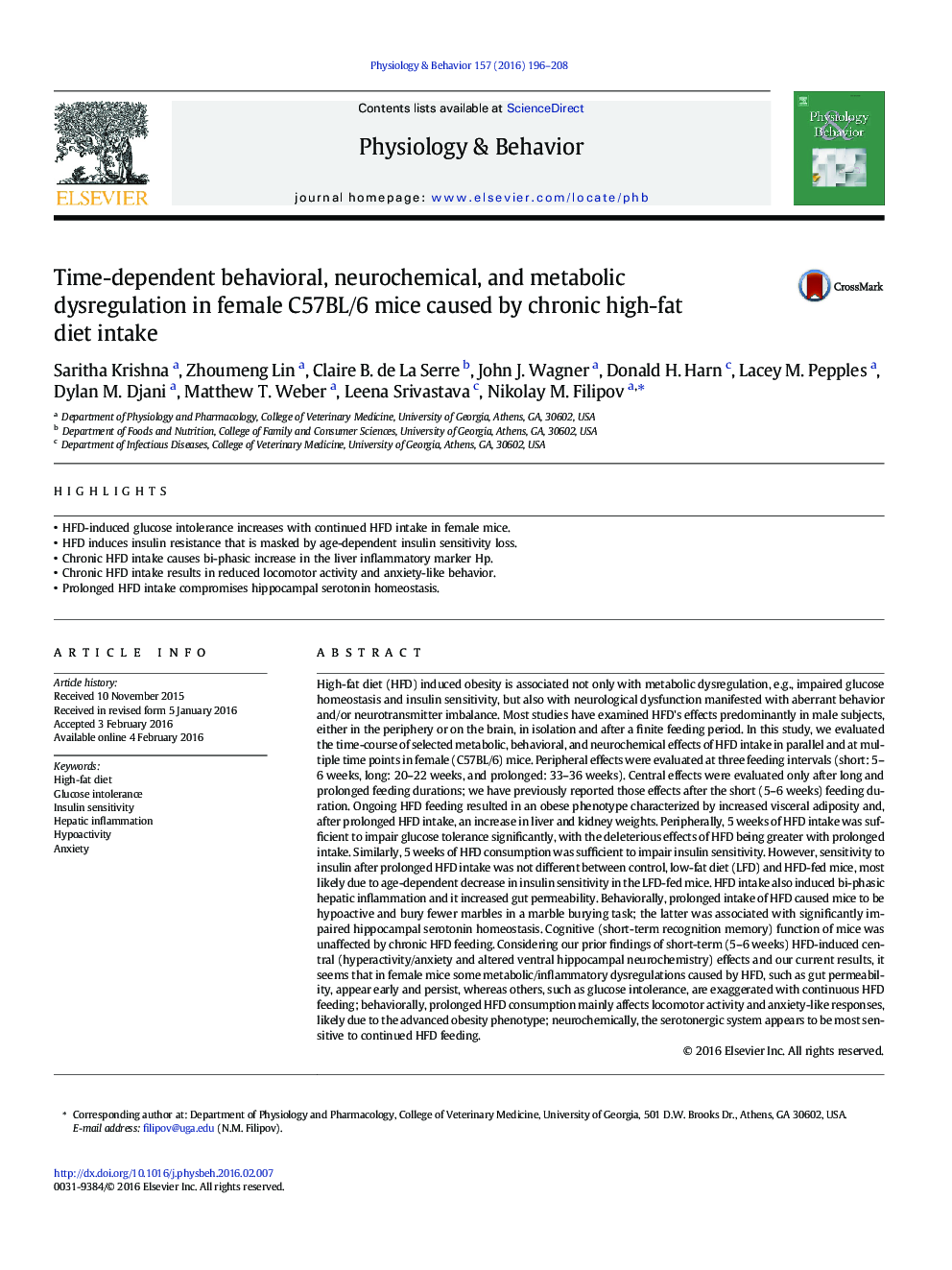| کد مقاله | کد نشریه | سال انتشار | مقاله انگلیسی | نسخه تمام متن |
|---|---|---|---|---|
| 2844022 | 1571161 | 2016 | 13 صفحه PDF | دانلود رایگان |

• HFD-induced glucose intolerance increases with continued HFD intake in female mice.
• HFD induces insulin resistance that is masked by age-dependent insulin sensitivity loss.
• Chronic HFD intake causes bi-phasic increase in the liver inflammatory marker Hp.
• Chronic HFD intake results in reduced locomotor activity and anxiety-like behavior.
• Prolonged HFD intake compromises hippocampal serotonin homeostasis.
High-fat diet (HFD) induced obesity is associated not only with metabolic dysregulation, e.g., impaired glucose homeostasis and insulin sensitivity, but also with neurological dysfunction manifested with aberrant behavior and/or neurotransmitter imbalance. Most studies have examined HFD's effects predominantly in male subjects, either in the periphery or on the brain, in isolation and after a finite feeding period. In this study, we evaluated the time-course of selected metabolic, behavioral, and neurochemical effects of HFD intake in parallel and at multiple time points in female (C57BL/6) mice. Peripheral effects were evaluated at three feeding intervals (short: 5–6 weeks, long: 20–22 weeks, and prolonged: 33–36 weeks). Central effects were evaluated only after long and prolonged feeding durations; we have previously reported those effects after the short (5–6 weeks) feeding duration. Ongoing HFD feeding resulted in an obese phenotype characterized by increased visceral adiposity and, after prolonged HFD intake, an increase in liver and kidney weights. Peripherally, 5 weeks of HFD intake was sufficient to impair glucose tolerance significantly, with the deleterious effects of HFD being greater with prolonged intake. Similarly, 5 weeks of HFD consumption was sufficient to impair insulin sensitivity. However, sensitivity to insulin after prolonged HFD intake was not different between control, low-fat diet (LFD) and HFD-fed mice, most likely due to age-dependent decrease in insulin sensitivity in the LFD-fed mice. HFD intake also induced bi-phasic hepatic inflammation and it increased gut permeability. Behaviorally, prolonged intake of HFD caused mice to be hypoactive and bury fewer marbles in a marble burying task; the latter was associated with significantly impaired hippocampal serotonin homeostasis. Cognitive (short-term recognition memory) function of mice was unaffected by chronic HFD feeding. Considering our prior findings of short-term (5–6 weeks) HFD-induced central (hyperactivity/anxiety and altered ventral hippocampal neurochemistry) effects and our current results, it seems that in female mice some metabolic/inflammatory dysregulations caused by HFD, such as gut permeability, appear early and persist, whereas others, such as glucose intolerance, are exaggerated with continuous HFD feeding; behaviorally, prolonged HFD consumption mainly affects locomotor activity and anxiety-like responses, likely due to the advanced obesity phenotype; neurochemically, the serotonergic system appears to be most sensitive to continued HFD feeding.
Journal: Physiology & Behavior - Volume 157, 1 April 2016, Pages 196–208